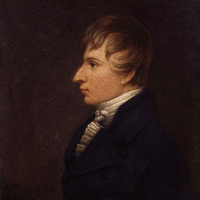Lines Supposed to Be Spoken by a Lover at the Grave of His Mistress
Mary, the moon is sleeping on thy grave,
And on the turf thy lover sad is kneeling,
The big tear in his eye.-Mary, awake,
From thy dark house arise, and bless his sight
On the pale moonbeam gliding. Soft, and low.
Pour on the silver ear of night thy tale,
Thy whisper’d tale of comfort and of love,
To soothe thy Edward’s lorn, distracted soul,
And cheer his breaking heart.-Come, as thou didst,
When o’er the barren moors the night wind howl’d,
And the deep thunders shook the ebon throne
Of the startled night!-O! then, as lone reclining,
I listen’d sadly to the dismal storm,
Thou on the lambent lightnings wild careering
Didst strike my moody eye;-dead pale thou wert,
Yet passing lovely.-Thou didst smile upon me,
And oh! thy voice it rose so musical,
Betwixt the hollow pauses of the storm,
That at the sound the winds forgot to rave,
And the stern demon of the tempest, charm’d,
Sunk on his rocking throne to still repose,
Lock’d in the arms of silence.
Spirit of her!
My only love! O! now again arise,
And let once more thine a?ry accents fall
Soft on my listening ear. The night is calm,
The gloomy willows wave in sinking cadence
With the stream that sweeps below. Divinely swelling
On the still air, the distant waterfall
Mingles its melody;-and, high above,
The pensive empress of the solemn night,
Fitful, emerging from the rapid clouds,
Shows her chaste face in the meridian sky.
No wicked elves upon the Warlock-knoll
Dare now assemble at their mystic revels.
It is a night when, from their primrose beds,
The gentle ghosts of injured innocents
Are known to rise and wander on the breeze,
Or take their stand by the oppressor’s couch,
And strike grim terror to his guilty soul.
The spirit of my love might now awake,
And hold its custom’d converse.
Mary, lo!
Thy Edward kneels upon thy verdant grave,
And calls upon thy name. The breeze that blows
On his wan cheek will soon sweep over him
In solemn music a funereal dirge,
Wild and most sorrowful. His cheek is pale,
The worm that prey’d upon thy youthful bloom
It canker’d green on his. Now lost he stands,
The ghost of what he was, and the cold dew,
Which bathes his aching temples, gives sure omen
Of speedy dissolution. Mary, soon
Thy love will lay his pallid cheek to thine,
And sweetly will he sleep with thee in death.

